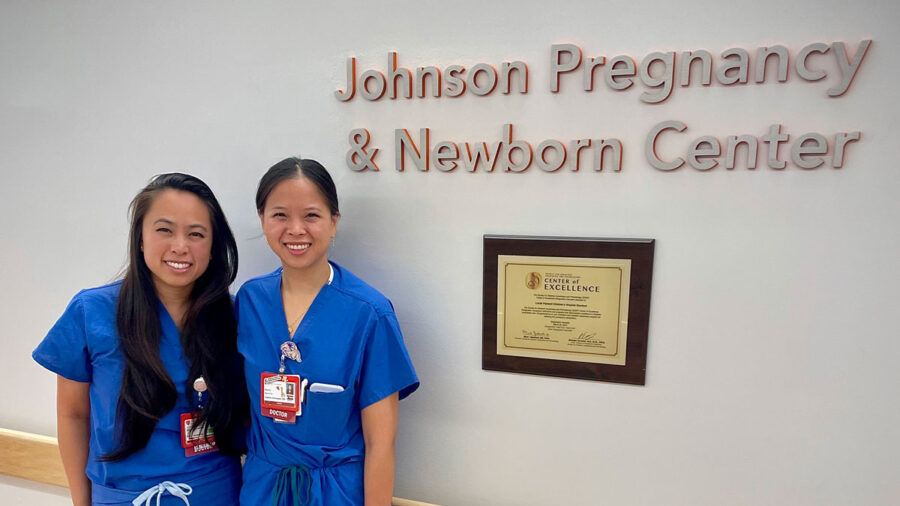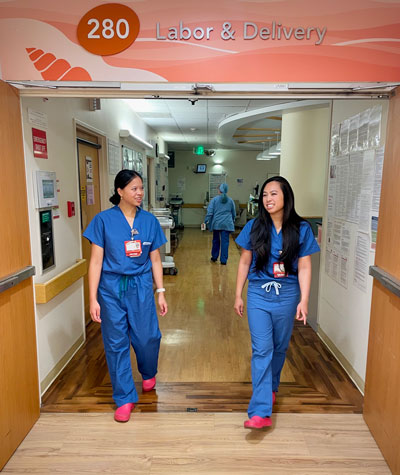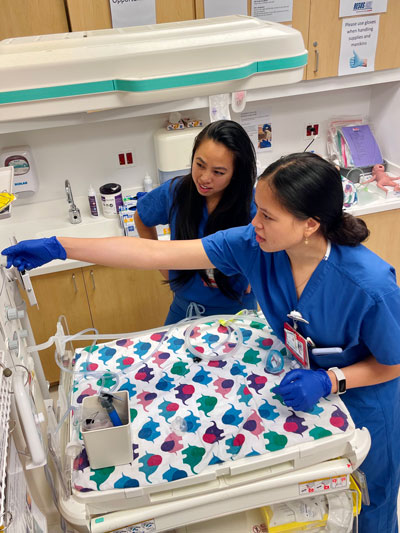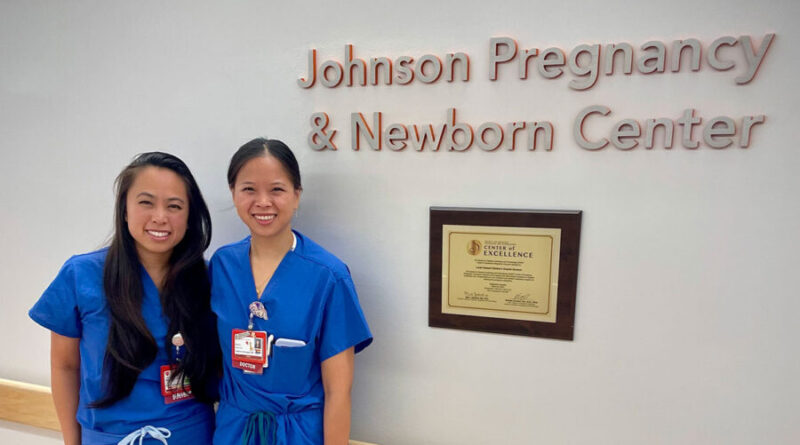Two Sisters Return to Bay Area to Work Together at Johnson Center for Pregnancy and Maternity Services – Stanford Medicine Children’s Health Blog
In honor of National Sisters Day, Dr. Daphne and Kelly Darmawan reflect on their journey as fellows at Lucile Packard Children’s Hospital Stanford

Daphne Darmawan, MD, MBS, remembers the first time she watched Kelly Darmawan, MD, give birth by cesarean section at Lucile Packard Children’s Hospital Stanford. “This is wild,” he remembers thinking, feeling a mixture of disbelief and pride. “That’s my sister.”
After giving birth, Kelly handed the baby to Daphne, who was standing next to the baby warming unit and the baby care team. “We’re very lucky in our jobs,” Kelly exclaims. “As an obstetrician, I am the first person to help bring a child into the world. It’s amazing that the second person is sometimes my sister, who is training to be a pediatrician.”
In honor of National Sisters’ Day on Aug. 4, Daphne and Kelly recently shared more about how they came to work together at the Johnson Center for Pregnancy and Maternal Services at Stanford Medicine’s Child Health Center, where prenatal care, baby and nts development offered. all in one place.

The Darmawan sisters are currently pursuing advanced, specialty training at Stanford School of Medicine—Kelly is an associate in Maternal-Fetal Medicine (MFM) in the Department of Obstetrics and Gynecology, and Daphne is an associate physician in Neonatology in the Department of Pediatrics. At Packard Children’s, both are important members of the care team.
While many senior doctors are responsible for overseeing all patients, colleagues like Daphne and Kelly are experienced doctors who interact with families on a regular basis. Fellows conduct research and actively participate in teaching other resident physicians.
Melissa Scala, MD, director of the Neonatology Fellowship Program, professor of Neonatology at Stanford University, and director of the Neonatal Neurodevelopmental Nurture Program at Stanford Medicine Children’s Health, is thrilled to have such talented doctors as Daphne and Kelly on the care team. of Children at Stanford. . “We believe that in order to learn to be a future doctor, you need to be in direct contact with patients and responsible. We take care of our colleagues closely, we give them extensive training and feedback, but in time together we believe they are critical to the high quality care we provide to our babies and families,” Dr. Scala says.
Bay Area roots and select medicine
Daphne, Kelly, and their brother grew up in Silicon Valley. Both of their parents immigrated to Indonesia to pursue higher education opportunities in the United States; and nothing to do with medicine. When the siblings were young, Daphne thought they all grew up to be software engineers.
Daphne is three years older than Kelly, and the two became very close during high school and college. Both attended a prestigious university in Southern California and majored in biology. Although their early studies did not meet, Daphne still introduced Kelly to the research lab on campus where she worked, as well as the extracurricular activities she participated in, such as polo. of water and volunteering at one of the local children’s hospitals. Daphne says of her sister: “She followed a certain path of mine, but also created her own.
Kelly felt drawn to improving health equity in medicine from an early age. During his childhood, he went to doctor’s appointments with his grandparents, most of whom spoke Chinese and Indonesian. He saw how his parents or his uncle often stepped in as translators. “That experience made me realize that cultural competency is an important part of health care, and that was part of what made me want to go into medicine,” she says. .
Participating in comprehensive maternal, neonatal and infant care at Stanford Children’s
Today, Daphne and Kelly are part of the Johnson Center for Pregnancy and Newborn Services care teams that help ensure the best possible outcomes for expectant mothers and their babies. Our facility is comprised of world-class physicians, nurses and staff, and our teams leverage the expertise of more than 30 medical and surgical specialties at Stanford Children’s, including pediatric radiology, surgery, pathology cardiology, nephrology, and more.
“We have such a large network of multi-disciplinary professionals who are interested in helping our patients,” says Kelly.
Kelly was the first of the Darmawan sisters to join the Stanford Children’s care team. From 2020 until earlier this summer, she was a gynecology resident.
Kelly loves the health of having children. She realizes that the education people receive about their health is different, especially depending on the cultural context, and she wants to ensure that everyone is informed about their bodies and their choices.

This August, Kelly begins her fellowship in Maternal-Fetal Medicine. He says: “I am very happy as my partner that I am teaching the residents the skills to work, and to give myself more time to think about the different and complex aspects of each patient’s care. A large part of his work will include counseling families with high-risk pregnancies, either about the results of prenatal tests or birth control methods, when appropriate.
The care that Kelly provides as a prenatal and infant medicine specialist parallels what Daphne does as a pediatrician. Importantly, they are both involved in the Maternal and Maternal Health Program at Stanford Children’s, coordinating the care of mother and baby before, during and after birth.
“I get calls from Kelly and other doctors and obstetricians about premature or complicated labors that require us to talk to the parents before the birth to give them an idea of what to expect during labor. and hospitalization. Neonatal Intensive Care Unit (NICU). We are also there for any delivery where the child may need resuscitation,” explains Daphne, who started as a fellow at Stanford in 2023.
Daphne finds satisfaction in caring for babies who spend days, weeks, or even months in the NICU. Working in the inpatient setting allows him to build trust and relationships with families. He says: “I really enjoy that deep relationship, seeing the family every day and getting to know them but I’m still thinking about how I can support them during this difficult time.
Sharing with her sister in caring for other like-minded families at the Johnson Center for Pregnancy and Maternity Services was something Daphne never expected, yet she is now enjoying it.
“Since both of us are very busy, we may not see each other except for delivering a patient during delivery. “However, we look out for each other, and it’s comforting to know that he understands my situation,” Daphne says. The best part is being able to support each other through our medical training.
Kelly adds, “Because the fields of obstetrics and prenatal and pediatric medicine are so closely related, it’s great to get Daphne’s perspective as a pediatrician and my older sister, whether it’s related to medical care, research, or life abroad.”
Learn more about us childbirth and baby care at Stanford Medicine Children’s Health >
#Sisters #Return #Bay #Area #Work #Johnson #Center #Pregnancy #Maternity #Services #Stanford #Medicine #Childrens #Health #Blog

